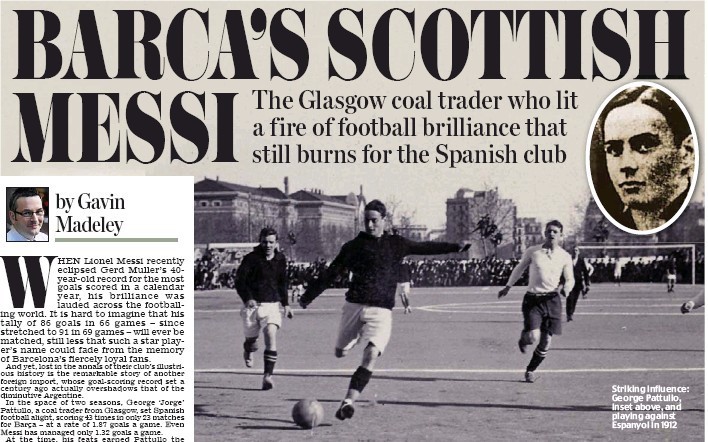Messi of the past, or even the original Messi: Who is George Pattullo?
The Scotsman whose story I will tell lived long before Archibald and flourished when football was played as an amateur. They call him the Messi of the past!

Did you know that Scottish Steve Archibald, who last played for Barça, was transferred to the Catalan giant from Tottenham Hotspur in the summer of 1984? The forward, who was born in Glasgow on 27 September 1956, played for 14 teams in his professional career, which started in East Stirlingshire in 1974. He scored 77 goals in 189 matches for Tottenham Hotspurs between 1980-84 and attracted the attention of the giants of European football. Archibald, who spent four seasons in the Catalan giant, scored 25 goals in 55 matches and won the league championship in Barça in the 1984-85 season...
But the Scotsman whose story I will tell, namely George Pattullo, lived long before Archibald and flourished when football was played as an amateur. According to The Guardian writer Gavin Jamieson, the story of the greatest goalscorer in the club's history was written in the 'Bara' magazine published by the club in June 2011. A long chapter is devoted to him in the "Barca's True Brits" section of the book "Tales from the Nou Camp" written by Jeff King. They call him the Messi of the past, a comparison that cannot be ignored even though football was played with different rules in those years...
George Simpson Drynan Pattullo (4 November 1888 – 5 September 1953) was a Scottish football player and manager active primarily in Spain. He has been described as FC Barcelona's "most import and influential British of all time." In addition to being an outstanding football player, a sport to which he owes his career, he was also an outstanding athlete who also performed in other modalities such as hockey, rugby, and tennis.
George Pattullo was born in Glasgow in 1889, a stone's throw from Hampden Park Stadium. He caught the attention of Barça managers while playing for the neighborhood team founded by immigrant Scots in Catalonia, where he immigrated in the early 1900s. The striker, who started as a goalkeeper and played as a striker in the second half of the match in which the team lost 5-1, scored 5 goals in the second half and helped his team win the match 6-5.
He played for Barça in the 1910-11 season and scored 41 goals in 20 matches. It is noteworthy that he achieved a higher goal rate than Messi, who scored 52 goals in 54 matches in the 2013-14 season. At that time, there was no other football player who hit the ball as hard and accurately as he did. He would practice volleyball against the wall and play wall tennis with his feet for hours without dropping the ball. While he was leaving the team, where he stayed for only one season, in May 1911, El Mundo Deportivo newspaper wrote that Barça had lost its invaluable star, its idol and that the rival goalkeeper should now be happy.
It was rumored that he would return to Barcelona in 1912. Joaquim Peris de Vargas, one of the directors of the club, wrote a letter to the football player and suggested he return. One day, the director, who had been waiting for a response from the football player for days, received a telegram stating that he would return to the city on Friday, but there was no signature on the telegram. In the following years, he explained that he did not sign the telegram so that it would not fall on the ears of Espanyol club managers and that he did not want to attract the attention of former Espanyol football player Green, who worked in the telegraph office. However, the news of his return spread by word of mouth, and when he set foot at the train station before an important match, he was welcomed by the managers of the Espanyol and Barça teams. He was the star of the match that Barça won 3-2 against Espanyola in 1912.
Returning to Scotland after his Barça adventure, the striker worked in coal mines for a while, and with the start of World War I, he joined the brigade in the Tyneside region, where the majority of Scots were made up, and was awarded the heroism medal after the war. He tried being a coach in the 1930s and worked for Club Baleares for a short time.
The most crucial point of his story is that he liked playing football as an amateur and thought that money and financial rewards had no place in the game. According to him, the beauty of football lies in the fact that it is amateur. During the years he played in Barça, Espanyol club made offers to the football player many times, but he preferred to play ball in Barça as an amateur. When he was playing for Barça, he didn't even ask for money for his trips to England.
-----------------------------------
https://www.pressreader.com/australia/fourfourtwo/20190206/283180084813018
